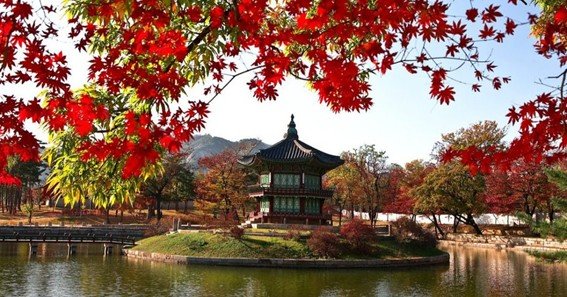South Korea, often referred to as the “Land of Morning Calm,” is a captivating destination that seamlessly blends ancient traditions with modern innovations. Whether you’re drawn by its vibrant culture, mouthwatering cuisine, or breathtaking landscapes, South Korea offers a unique and enriching travel experience.
Cultural Heritage and Traditions
South Korea boasts a rich tapestry of cultural heritage, evident in its historic palaces, temples, and traditional villages. Visitors can explore UNESCO World Heritage Sites like the Hahoe Folk Village, which preserves Joseon Dynasty-era architecture and customs. The country’s commitment to preserving its traditions offers travelers a deep dive into its storied past.
Culinary Delights
Korean cuisine is renowned for its bold flavors and diverse dishes. From sizzling bulgogi (marinated beef) to spicy kimchi and comforting bibimbap (mixed rice with vegetables), the food scene is a gastronomic adventure. Street markets and local eateries provide authentic experiences that tantalize the taste buds.
Natural Beauty and Outdoor Adventures
The country’s diverse landscapes range from serene beaches to rugged mountains. National parks like Seoraksan and Jirisan offer hiking opportunities amidst stunning scenery. Jeju Island, a UNESCO World Heritage Site, captivates visitors with its volcanic landscapes and unique flora.
Pop Culture and Entertainment
South Korea’s global influence in music and entertainment, known as the “Korean Wave” or Hallyu, has captivated audiences worldwide. K-pop concerts, K-drama filming locations, and themed cafes allow fans to immerse themselves in the vibrant pop culture scene.
Technological Innovation
As a leader in technology, South Korea offers a glimpse into the future with its advanced infrastructure, high-speed internet, and smart cities. Visitors can experience cutting-edge innovations firsthand, from automated convenience stores to state-of-the-art public transportation systems.
FAQ
1. What is the best time to visit South Korea?
Spring (April to June) and autumn (September to November) are ideal, offering pleasant weather and beautiful natural scenery.
2. Do I need a visa to travel to South Korea?
Visa requirements vary by country. It’s advisable to check with the South Korean embassy or consulate in your country before planning your trip.
3. Is South Korea safe for tourists?
Yes, South Korea is considered a safe destination with low crime rates and a strong emphasis on public safety.
4. What languages are spoken in South Korea?
Korean is the official language. English is widely taught and understood in major cities and tourist areas.
5. Can I use public transportation easily in South Korea?
Absolutely. South Korea has an extensive and efficient public transportation system, including subways, buses, and high-speed trains.
In conclusion, the question “Why do you want to go to South Korea?” can be answered with a myriad of reasons, each more compelling than the last. From its rich cultural heritage and delectable cuisine to its natural beauty and technological advancements, South Korea promises an unforgettable journey for every traveler.










